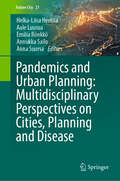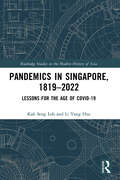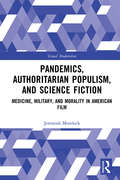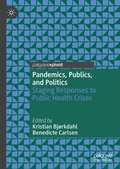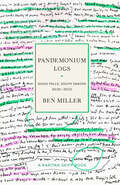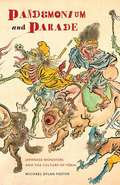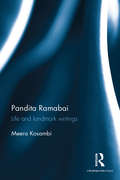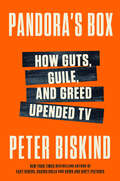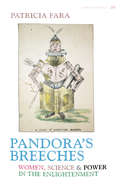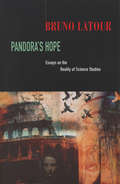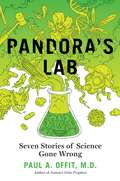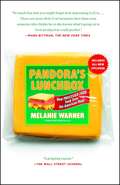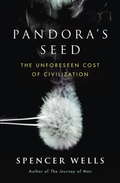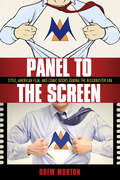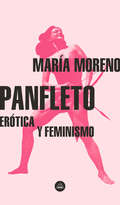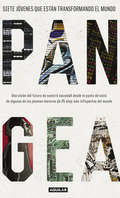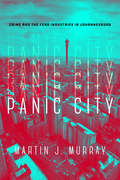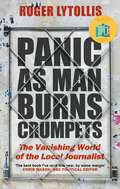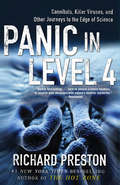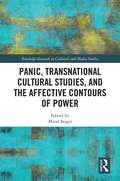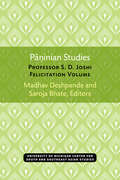- Table View
- List View
Pandemics and Urban Planning: Multidisciplinary Perspectives on Cities, Planning and Disease (Future City #21)
by Annukka Sailo Helka-Liisa Hentilä Aale Luusua Emilia Rönkkö Anna SuorsaAlthough the environment has long been recognized as a key factor for human health, the linkages between infectious diseases and urban environments are not well known. Consideration of infectious disease prevention and control in contemporary urban planning has largely been neglected. The proposed book discusses in a multidisciplinary manner the role of urban living environments and prevention of infectious disease epidemic and thus, pandemic outbreaks in history and presently, in the post-Covid era. From historical studies of urban outbreaks to present issues and charting pathways into the future urban planning, the edited book curates a collection of timely research from the fields of environmental research, environmental health, health history, information studies, public health, and urban planning. The book offers research-based insights into the linkages between urban living environments and human health, serving as inspiration for researchers, students and professionals.
Pandemics in Singapore, 1819–2022: Lessons for the Age of COVID-19 (Routledge Studies in the Modern History of Asia)
by Kah Seng Loh Li Yang HsuSingapore has faced many pandemics over the centuries, from plague, smallpox and cholera to influenza and novel coronaviruses. By examining how different governments responded, this book considers what we can learn from their experiences. Public health strategies in the city-state were often affected by issues of ethnicity and class, as well as failure to take heed of key learnings from previous outbreaks. Pandemics are a recurrent and normal feature of the human experience. Alongside medical innovation and evidence-based policymaking, the study of history is also crucial in preparing for future pandemics.
Pandemics, Authoritarian Populism, and Science Fiction: Medicine, Military, and Morality in American Film (Visual Modernities)
by Jeremiah MorelockWith a focus on I Am Legend and Day of the Dead—two series of film remakes of popular science fiction stories—this book addresses the social origins of the recent surge in authoritarian and populist social movements. Exploring the ways in which the themes of tribalism, confidence in medical science, and confidence in military violence changed over the years in the process of re-telling these stories in popular culture, the author identifies the shift towards a narrowing of moral scope, an embrace of military violence and a distrust of medical science with three elements of authoritarian populism: tribalism, distrust of rational elites and their institutions, and willingness for violent coercion. An engaging study of popular culture that sheds light on contemporary political attitudes, Pandemics, Authoritarian Populism, and Science Fiction will appeal to scholars of sociology, social theory, and cultural studies with interests in critical theory, film studies, and science fiction.
Pandemics, Publics, and Politics: Staging Responses To Public Health Crises
by Kristian Bjørkdahl Benedicte CarlsenPandemics are potentially very destructive phenomena, and for that reason, they both fascinate and frighten us. And because they are shot through with uncertainty, they often become sites of contestation and conflict. This book presents research on the 2009 pandemic and other public health crises in an attempt to describe and analyze the distinctive challenges that such diseases pose today. Thanks to vaccines, more reliable provision of medical services, more effective means of communication, and a more educated public, some argue we will not see a new Black Plague – or even Spanish Flu – in our time. Today we face new challenges, however, which can both enable diseases to reach pandemic scales and affect our ability to enact an appropriate response. Those include fragmentation of media, tribalization of “knowledge regimes,” the increasingly troubled status of scientific and political expertise, growing cross-continental mobility, as well as the globalization and commercialization of pandemic response systems. These distinctive complexities make the need to stage public action in response to pandemics and other public health crises a crucial problem, on which thousands of human lives hinge. This volume consists of a handful of social science and humanities studies of precisely such complexities, and thus offers a much-needed supplement to existing research on pandemics and pandemic response.
Pandemie im Film: Religiöse und ästhetische Transformationen in der Populärkultur (pop.religion: lebensstil – kultur – theologie)
by Harald Schroeter-Wittke Inge KirsnerUntersucht wird die theologische und ästhetische Bearbeitung der Pandemien in dystopischen und Science-Fiction-Filmen sowie Serien. Zwischen Verschwörungstheorien, der Sicht als Strafe Gottes und der fatalistischen Annahme eines "notwenigen Übels" changieren die Erklärungsmodelle im Film wie auch in der gesellschaftlichen Wirklichkeit. Filme bieten dabei stellvertretend narrative Lösungsmodelle an. Die Katastrophe wird auf diese Weise dem beängstigenden Alltag für kurze Zeit enthoben, was eine der Reflexion zuträgliche Distanz ermöglicht. Exemplarisch wird ein sich wandelndes Rollen-, Gesellschafts- und Gottesbild aufgezeigt, das zu religionspädagogischen Reflexionen anregt.
Pandemisches Virus – nationales Handeln: Covid-19 und die europäische Idee (Räume – Grenzen – Hybriditäten)
by Dominik Brodowski Florian Weber Jonas NesselhaufDie Covid-19-Pandemie fordert die europäische Idee heraus: Denn nicht nur die EU-Außengrenzen, sondern auch Binnengrenzen innerhalb des Schengen-Raums wurden ab Frühjahr 2020 wieder verstärkt kontrolliert, durch an deren Überquerung anknüpfende Quarantäne- und Test-Vorschriften zum Hindernis oder auch zeitweise ganz geschlossen. Damit sind die geographischen Grenzverläufe für Berufspendelnde, für Ausflügler:innen oder für Einkaufende wieder ,real‘. Doch reichen die Auswirkungen über Transit, Tourismus und Handel weit hinaus: Mit den verstärkten Kontrollen, Quarantänepflichten und Schließungen verändert sich auch die Wirkung der territorialen Grenz(ziehung)en. Das betrifft schließlich auch die grenzüberschreitende Zusammenarbeit in binneneuropäischen Grenzregionen. Im Zusammenspiel aus Kultur-, Raum- und Rechtswissenschaften erfolgt im Sammelband eine multiperspektivisch vertiefende Beleuchtung zu Covid-19 und der europäischen Idee.
Pandemonium Logs: Sioux Falls, South Dakota, 2020–2022 (Raritan Skiff Books)
by Ben MillerIn 2015, Ben Miller and the poet Anne Pierson Wiese moved from New York City to Sioux Falls, South Dakota, to explore their midwestern roots and to focus on their writing careers. Working a day job in a hospital, Miller had a front-row seat to the COVID-19 pandemic as it moved from the coasts to the urban Midwest. Pandemonium Logs casts an unflinching eye on the state of the worker in the US health-care system during a global pandemic, giving voice to the doctors, nurses, support staff, patients, and families caught in the complex swirl of daily dilemmas and crucial choices. In unsparing yet sympathetic prose, Ben Miller creates an intimate portrait of the impact of COVID on the diverse people of South Dakota. Through a wide range of characters—from understandably confused patients to quietly competent nurses—he explores the human complexities of the crisis: a doctor based in Mumbai who treats critically ill patients in the Dakotas via a tenuous hodgepodge of telehealth apparatus, a Hydra of six workplace trainers who together cannot train one employee to do one job, a vice president of corporate hospitality who lives to rip down safety signs as fast as nurses post them, a ninety-year-old hospital volunteer who pushes wheelchairs containing patients half his age. In Pandemonium Logs, Miller provides precise and moving observations of ordinary people doing extraordinary things.
Pandemonium and Parade: Japanese Monsters and the Culture of Yokai
by Michael FosterWater sprites, mountain goblins, shape-shifting animals, and the monsters known as yôkai have long haunted the Japanese cultural landscape. This history of the strange and mysterious in Japan seeks out these creatures in folklore, encyclopedias, literature, art, science, games, manga, magazines, and movies, exploring their meanings in the Japanese cultural imagination and offering an abundance of valuable and, until now, understudied material. Michael Dylan Foster tracks yôkai over three centuries, from their appearance in seventeenth-century natural histories to their starring role in twentieth-century popular media. Focusing on the intertwining of belief and commodification, fear and pleasure, horror and humor, he illuminates different conceptions of the "natural" and the "ordinary" and sheds light on broader social and historical paradigms―and ultimately on the construction of Japan as a nation.
Pandita Ramabai: Life and landmark writings
by Meera KosambiThis book looks at the life of Pandita Ramabai, one of the major social reformers of 19th-century India. Her unique life trajectory spanned across a pan-Indian, orthodox Hindu mould to being part of Brahmo Samaj and Prarthana Samaj, and further to Christianity. At the age of 30 she had travelled widely within India and across the world, from USA and UK in the West to Japan in the Far East. She reported these fascinating journeys to international friends and fellow Maharashtrians in both English and Marathi. Fighting conservatism and marginalization she set up several projects to empower women, notably, the Sharada Sadan in Mumbai and the Mukti Mission in Kedgaon near Pune in Maharashtra. <P><P>This work locates Pandita Ramabai within her liminal social milieu and discursive networks during various phases of her life, and traces her diverse ideological routes along with her critical writings, some of which have been retrieved and/or presented in English translation here for the first time, including The High-Caste Hindu Woman and the newly discovered Voyage to England. Offering a comprehensive insight into aspects of 19th-century Indian society — religion and reform, women’s rights and feminism, social movements, poverty, and colonialism — this book will greatly interest researchers and students of South Asian history, sociology, and gender studies.
Pandora's Box: How Guts, Guile, and Greed Upended TV
by Peter BiskindA NEW YORKER BEST BOOKS OF 2023 SELECTION“Biskind’s saga about the rise and fall of prestige television explains, in punchy, propulsive prose, how we went from Tony Soprano to Ted Lasso.” —New YorkerBestselling author of Easy Riders, Raging Bulls and Down and Dirty Pictures, cultural critic Peter Biskind turns his eye toward the new golden age of television, sparked by the fall of play-it-safe network TV and the rise of boundary-busting cable, followed by streaming, which overturned both—based on exclusive, candid, and colorful interviews with executives, writers, showrunners, directors, and actorsWe are now lucky enough to be living through the era of so-called Peak TV, in which television, in its various guises and formats, has seized the entertainment mantle from movies and dominates our leisure time. How and why this happened is the subject of this book.Instead of focusing on one service, like HBO, Pandora’s Box asks, “What did HBO do, besides give us The Sopranos?” The answer: It gave us a revolution. Biskind bites off a big chunk of entertainment history, following HBO from its birth into maturity, moving on to the basic cablers like FX and AMC, and ending up with the streamers and their wars, pitting Netflix against Amazon Prime Video, Max, and the killer pluses—Disney, Apple TV, and Paramount.Since the creative and business sides of TV are thoroughly entwined, Biskind examines both, and the interplay between them. Through frank and shockingly intimate interviews with creators and executives, Pandora’s Box investigates the dynamic interplay of commerce and art through the lens the game-changing shows they aired—not only old warhorses like The Sopranos, but recent shows like The White Lotus, Succession, and Yellow- (both -stone and -jackets)—as windows into the byzantine practices of the players as they use money and guile to destroy their competitors.In the end, this book crystal-balls the future in light of the success and failures of the streamers that, after apparently clearing the board, now face life-threatening problems, some self-created, some not. With its long view and short takes—riveting snapshots of behind-the-scenes mischief—Pandora’s Box is the only book you’ll need to read to understand what’s on your small screen and how it got there.
Pandora's Breeches: Women, Science and Power in the Enlightenment
by Patricia Fara'Had God intended Women merely as a finer sort of cattle, he would not have made them reasonable.' Writing in 1673, Bathsua Makin was one of the first women to insist that girls should receive a scientific education. Despite the efforts of Makin and her successors, women were excluded from universities until the end of the nineteenth century, yet they found other ways to participate in scientific projects.Taking a fresh look at history, Pandora's Breeches investigates how women contributed to scientific progress. As well as collaborating in home-based research, women corresponded with internationally-renowned scholars, hired tutors, published their own books and translated and simplified important texts, such as Newton's book on gravity. They played essential roles in work frequently attributed solely to their husbands, fathers or friends.
Pandora's Hope: Essays on the Reality of Science Studies
by Bruno LatourA scientist friend asked Bruno Latour point-blank: “Do you believe in reality?” Taken aback by this strange query, Latour offers his meticulous response in Pandora’s Hope. It is a remarkable argument for understanding the reality of science in practical terms. In this book, Latour, identified by Richard Rorty as the new “bête noire of the science worshipers,” gives us his most philosophically informed book since Science in Action. Through case studies of scientists in the Amazon analyzing soil and in Pasteur’s lab studying the fermentation of lactic acid, he shows us the myriad steps by which events in the material world are transformed into items of scientific knowledge. Through many examples in the world of technology, we see how the material and human worlds come together and are reciprocally transformed in this process. Why, Latour asks, did the idea of an independent reality, free of human interaction, emerge in the first place? His answer to this question, harking back to the debates between Might and Right narrated by Plato, points to the real stakes in the so-called science wars: the perplexed submission of ordinary people before the warring forces of claimants to the ultimate truth.
Pandora's Lab: Seven Stories of Science Gone Wrong
by Paul A. OffitWhat happens when ideas presented as science lead us in the wrong direction? History is filled with brilliant ideas that gave rise to disaster, and this book explores the most fascinating—and significant—missteps: from opium's heyday as the pain reliever of choice to recognition of opioids as a major cause of death in the U.S.; from the rise of trans fats as the golden ingredient for tastier, cheaper food to the heart disease epidemic that followed; and from the cries to ban DDT for the sake of the environment to an epidemic-level rise in world malaria. These are today's sins of science—as deplorable as mistaken past ideas about advocating racial purity or using lobotomies as a cure for mental illness. These unwitting errors add up to seven lessons both cautionary and profound, narrated by renowned author and speaker Paul A. Offit. Offit uses these lessons to investigate how we can separate good science from bad, using some of today's most controversial creations—e-cigarettes, GMOs, drug treatments for ADHD—as case studies. For every "Aha!" moment that should have been an "Oh no," this book is an engrossing account of how science has been misused disastrously—and how we can learn to use its power for good.
Pandora's Lunchbox: How Processed Food Took Over the American Meal
by Melanie WarnerIn the tradition of Fast Food Nation and The Omnivore's Dilemma a fascinating and cutting-edge look at the scary truth about what really goes into our food. If a piece of individually wrapped cheese retains its shape, color, and texture for years, what does it say about the food we eat and feed our children? Former New York Times business reporter and mother Melanie Warner decided to explore that question when she observed the phenomenon of the indestructible cheese. She began an investigative journey that takes her to research labs, food science departments, and factories around the country. What she discovered provides a rare, eye-opening--and sometimes disturbing--account of what we're really eating. Warner looks at how decades of food science have resulted in the cheapest, most abundant, most addictive, and most nutritionally devastating food in the world, and she uncovers startling evidence about the profound health implications of the packaged and fast foods that we eat on a daily basis.From breakfast cereal to chicken subs to nutrition bars, processed foods account for roughly 70 percent of our nation's calories. Despite the growing presence of farmers' markets and organic produce, strange food additives are nearly impossible to avoid. Combining meticulous research, vivid writing, and cultural analysis, Warner blows the lid off the largely undocumented--and lightly regulated--world of chemically treated and processed foods and lays bare the potential price we may pay for consuming even so-called "healthy" foods.
Pandora's Seed: Why the Hunter-Gatherer Holds the Key to Our Survival
by Spencer WellsTen thousand years ago, our species made a radical shift in its way of life: We became farmers rather than hunter-gatherers. Although this decision propelled us into the modern world, renowned geneticist and anthropologist Spencer Wells demonstrates that such a dramatic change in lifestyle had a downside that we're only now beginning to recognize. Growing grain crops ultimately made humans more sedentary and unhealthy and made the planet more crowded. The expanding population and the need to apportion limited resources created hierarchies and inequalities. Freedom of movement was replaced by a pressure to work that is the forebear of the anxiety millions feel today. Spencer Wells offers a hopeful prescription for altering a life to which we were always ill-suited. Pandora's Seed is an eye-opening book for anyone fascinated by the past and concerned about the future.
Panel to the Screen: Style, American Film, and Comic Books during the Blockbuster Era
by Drew MortonOver the past forty years, American film has entered into a formal interaction with the comic book. Such comic book adaptations as Sin City, 300, and Scott Pilgrim vs. the World have adopted components of their source materials' visual style. The screen has been fractured into panels, the photographic has given way to the graphic, and the steady rhythm of cinematic time has evolved into a far more malleable element. In other words, films have begun to look like comics. Yet, this interplay also occurs in the other direction. In order to retain cultural relevancy, comic books have begun to look like films. Frank Miller's original Sin City comics are indebted to film noir while Stephen King's The Dark Tower series could be a Sergio Leone spaghetti western translated onto paper. Film and comic books continuously lean on one another to reimagine their formal attributes and stylistic possibilities. In Panel to the Screen, Drew Morton examines this dialogue in its intersecting and rapidly changing cultural, technological, and industrial contexts. Early on, many questioned the prospect of a "low" art form suited for children translating into “high” art material capable of drawing colossal box office takes. Now the naysayers are as quiet as the queued crowds at Comic-Cons are massive. Morton provides a nuanced account of this phenomenon by using formal analysis of the texts in a real-world context of studio budgets, grosses, and audience reception.
Panfleto: Erótica y feminismo
by María MorenoArtículos, crónicas y ensayos antipatriarcales de la más conspicua e irreverente feminista argentina contemporánea. Autora fundamental de la crónica, el microensayo y la literatura del yo, es en Panfleto, sin embargo, que María Moreno revela el más persistente de sus intereses intelectuales, políticos, literarios y críticos. Publicados a lo largo de cuarenta años en revistas y diarios de circulación y suerte diversa, estos artículos pueden leerse no solo como "cuadernos de aprendizaje", sino como bitácora de un movimiento que se volvió masivo y como un manifiesto insurgente y solidario. «A finales de los años ochenta y noventa yo me intoxicaba con las importaciones teóricas de las feministas de la nueva izquierda que releían en la estructura de la familia en el capitalismo la sevicia del trabajo invisible, de las estructuralistas de la diferencia que inventaban un Freud a su favor y de las marxistas contra el ascetismo rojo. No leía, volaba. (...) Es decir, escribía animada por lo que iba aprendiendo, relacionando o imaginando que inventaba, sola y exaltada. Porque no recuerdo que supiera quiénes me leían, a quiénes me dirigía», declara. Recuperados como corpus, estos textos sobre erótica y feminismo van hoy al encuentro de millones de activistas, de militantes, de rebeldes. «Somos muchos los que consideramos a María Moreno la mejor cronista argentina de todos los tiempos y una de las voces documentales más lúcidas de la lengua, entre otras hipérboles razonables.»Jorge Carrión, The New York Times «La verdad de Moreno es una norma de estilo, de un gran estilo plebeyo.»Carlos Pardo, Babelia «Hija de una época violentísima y canalla, María Moreno es una de las escritoras latinoamericanas que más me han impresionado últimamente.»Christopher Domínguez Michael «La escritura es para María Moreno la versión amorosa de lo que eran para Foucault los archivos judiciales del siglo XVIII: el lugar problemático donde "los irrescatables" -MM dixit- son interrogados y hablados, pero así y todo hacen oír, acaso por única vez, algo parecido a una voz, una voz hecha de todo lo que nadie quiere escuchar, lo que se ningunea por idiota o irrelevante, lo que se rechaza por defectuoso, balbuceante o excéntrico.»Alan Pauls
Pangea
by Varios AutoresUna visión del futuro de nuestra sociedad desde el punto de vista de siete de los jóvenes menores de veinticinco años más influyentes del mundo. ¿Alguien escucha las voces de la generación más preparada de la historia?Definitivamente no, o al menos no lo suficiente. Nuestro mundo escucha cada día en los medios de comunicación las voces y las ideas de aquellos que dirigen nuestra sociedad, voces que llevan sonando en nuestras cabezas desde hace décadas. Pangea recoge distintas argumentaciones sobre cómo mejorar y transformar nuestra sociedad global elaboradas por siete de los jóvenes más importantes e influyentes en sus ámbitos a nivel mundial. Unas voces que no quieren pertenecer a una generación perdida sino todo lo contrario. Pablo González Ruiz de la Torre: fundador de la primera red social para el fomento del talento joven y colaborador en distintos proyectos, como Singularity Universiy, institución fundada por la NASA y Google. André Leonardo: emprendedor que ha dado la vuelta al mundo para promover la cultura portuguesa y que hoy es ya embajador de Lisboa en el mundo. Mohamed Amine: el joven más influyente de África según Huffington Post. Luis Iván Cuende: uno de los mejores programadores de Europa y fundador de tres empresas. Alec Urbach: escritor, cineasta, orador, empresario social, fundador de una escuela de animación y director de una empresa que produce cómics educativos. Katia Gómez: una de las emprendedoras sociales más influyentes de Latinoamérica. Tomás Álvarez Belón: hijo de la familia superviviente del tsunami de Tailandia de 2004 que inspiró Lo imposible y hoy un brillante estudiante de Política y Filosofía en Georgetown.
Panic (Shortcuts)
by Keith TesterImpending environmental catastrophe, threat of terrorism, viruses both biological and virtual, disease: there seem to be so many reasons to panic today. But what is panic and why does it happen? This book uses a range of literature from sociology, cultural studies and popular psychology to develop an original analysis of panic in contemporary social life. Bringing together academic literature from a range of disciplines, films, novels and current affairs, it encourages thought about why and how we panic – both individually and collectively. Keith Tester explores how cataclysmic events and smaller-scale episodes expose the fragility of our relationships, institutions and expectations. He shows how thinking about panic reveals key aspects of contemporary social, cultural and personal relationships. Panic is a highly readable and incisive introduction to the subject for students, scholars and all those who want to know what panic means and why it is important.
Panic City: Crime and the Fear Industries in Johannesburg
by Martin J. MurrayDespite the end of white minority rule and the transition to parliamentary democracy, Johannesburg remains haunted by its tortured history of racial segregation and burdened by enduring inequalities in income, opportunities for stable work, and access to decent housing. Under these circumstances, Johannesburg has become one of the most dangerous cities in the world, where the yawning gap between the 'haves' and 'have-nots' has fueled a turn toward redistribution through crime. While wealthy residents have retreated into heavily fortified gated communities and upscale security estates, the less affluent have sought refuge in retrofitting their private homes into safe houses, closing off public streets, and hiring the services of private security companies to protect their suburban neighborhoods. Panic City is an exploration of urban fear and its impact on the city's evolving siege architecture, the transformation of policing, and obsession with security that has fueled unprecedented private consumption of 'protection services.' Martin Murray analyzes the symbiotic relationship between public law enforcement agencies, private security companies, and neighborhood associations, wherein buyers and sellers of security have reinvented ways of maintaining outdated segregation practices that define the urban poor as suspects.
Panic as Man Burns Crumpets: The Vanishing World of the Local Journalist
by Roger Lytollis'For those who know about provincial newspapers, this will be a classic and a gem. Those who don't know will envy what they have missed' MELVYN BRAGG'Brisk and entertaining. A very readable love letter to a disappearing world, told with verve and tenderness' STUART MACONIE, author of Pies and Prejudice'Gut-bustingly funny, poignant and packed with astonishing insider information'M. W. CRAVEN, author of the award-winning The Puppet ShowYou dreamed of being a journalist and the dream has come true. You love working for your local paper . . . although not everything is as you imagined.You embarrass yourself with a range of celebrities, from John Hurt to Jordan. Your best story is 'The Man With the Pigeon Tattoo'.A former colleague interviews President Trump. You urinate in the president of the Mothers' Union's garden. Your appearance as a hard-hitting columnist on a BBC talk show does not go well. And being photographed naked is only the second most humiliating thing to happen one infamous afternoon. There are serious stories, such as a mass shooting, a devastating flood, and the search for Madeleine McCann.Meanwhile local papers are dying. Your building is crumbling and your readership is dwindling. Your carefully crafted features are read by fewer people than a story about fancy dress for dogs. Panic as Man Burns Crumpets is the inside story of local newspapers during the past twenty-five years, told in a way that's funny, poignant and revealing.
Panic as Man Burns Crumpets: The Vanishing World of the Local Journalist
by Roger Lytollis'For those who know about provincial newspapers, this will be a classic and a gem. Those who don't know will envy what they have missed' MELVYN BRAGG'Brisk and entertaining. A very readable love letter to a disappearing world, told with verve and tenderness' STUART MACONIE, author of Pies and Prejudice'Gut-bustingly funny, poignant and packed with astonishing insider information'M. W. CRAVEN, author of the award-winning The Puppet Show'Local journalism has never seemed more exotic than in this part-memoir, part-ode to that disappearing art, which is as funny as it is endearing . . . Told with a tender fondness, the bonkers, baffling but vital world of local press is paraded with the style that it deserves'JONATHAN WHITELAW, Sun'Refreshingly honest, engagingly self-deprecating, tremendously funny and more than a little heartbreaking. By far my favourite read of the year so far'MIKE WARD, TV editor, Daily Express/Daily Star 'Local publishers . . . need to hold on to thoughtful, dedicated writers such as Roger Lytollis, or his book will be an epitaph to a centuries-old industry'IAN BURRELL, i paper'Anyone who has ever worked at a local newspaper, or wondered what it is like, should read this book'DOMINIC PONSFORD, media editor at New Statesman Media Group/editor-in-chief at Press Gazette'[Lytollis] writes with clarity, comically self-effacing honesty and surprising poignancy . . . [this is] the story of what it is like to love what you do, and be great at it, and to watch it collapse around you in slow motion' ROBYN VINTER, GuardianYou dreamed of being a journalist and the dream has come true. You love working for your local paper . . . although not everything is as you imagined.You embarrass yourself with a range of celebrities, from John Hurt to Jordan. Your best story is 'The Man With the Pigeon Tattoo'.A former colleague interviews President Trump. You urinate in the president of the Mothers' Union's garden. Your appearance as a hard-hitting columnist on a BBC talk show does not go well. And being photographed naked is only the second most humiliating thing to happen one infamous afternoon. There are serious stories, such as a mass shooting, a devastating flood, and the search for Madeleine McCann.Meanwhile local papers are dying. Your building is crumbling and your readership is dwindling. Your carefully crafted features are read by fewer people than a story about fancy dress for dogs. Panic as Man Burns Crumpets is the inside story of local newspapers during the past twenty-five years, told in a way that's funny, poignant and revealing.
Panic in Level 4: Cannibals, Killer Viruses, and Other Journeys to the Edge of Science
by Richard PrestonPanic in Level 4 is a grand tour through the eerie and unforgettable universe of Richard Preston, filled with incredible characters and mysteries that refuse to leave one's mind. Here are dramatic true stories from this acclaimed and award-winning author, including * the phenomenon of "self-cannibals," who suffer from a rare genetic condition caused by one wrong letter in their DNA that forces them to compulsively chew their own flesh--and why everyone may have a touch of this disease * the search for the unknown host of Ebola virus, an organism hidden somewhere in African rain forests, where the disease finds its way into the human species, causing outbreaks of unparalleled horror * the brilliant Russian brothers--"one mathematician divided between two bodies"--who built a supercomputer in their apartment from mail-order parts in an attempt to find hidden order in the number pi (π). In exhilarating detail, Preston portrays the frightening forces and constructive discoveries that are currently roiling and reordering our world, once again proving himself a master of the nonfiction narrative.
Panic, Transnational Cultural Studies, and the Affective Contours of Power (Routledge Research in Cultural and Media Studies)
by Micol SeigelThis volume explores the panic that is a central affective register of our current international order. Fears of Somali pirates, "Gypsy" kidnappers, African warlords, Ebola, "Mexican meth," pimps, coyotes, gangs, climate refugees and more, structure the dark side of a metropolitan unconscious. These are terrors over things that (might) cross borders, threatening the sanctity of territoriality and capital. Inspired by scholarship challenging panics around human and sex trafficking, the contributors to this volume develop the umbrella category of the global moral panic. Embracing the challenge of grasping a phenomenon not previously regarded as cohering, they consider panics provoked by travel, passage, transgression; panics over bodies that move. Like panics over trafficking, the episodes narrated here ride and feed a field of common sense regarding crime, rights, and state power. Their logics of victims and villains nourish notions of the centrality of punishment, drawing from and feeding taxonomies of gender, race, and nation, solidifying the order craved by capital. They spotlight the coloniality of power, the ongoing salience of empire, the savior logics of rescue, and the profound sexism organizing hierarchies of bodies and places. Panic, this volume diagnoses, is a crucial, undertheorized facet of contemporary local-global relations.
Paninian Studies: Professor S. D. Joshi Felicitation Volume (Michigan Papers On South And Southeast Asia #37)
by Madhav M. DeshpandePa?ini’s grammar is the oldest surviving grammar of Sanskrit, dating back to the fifth century BCE. In its completeness of coverage of linguistic elements and its theoretical and analytical sophistication, Pa?ini’s grammar is surprisingly modern. It has long provided inspiration for many ideas in modern linguistics, and continues to attract scholars’ attention in the fields of Sanskrit and linguistics. Pa?inian Studies collects seventeen essays on Pa?inian linguistics in a single volume dedicated to Professor S. D. Joshi, a stalwart scholar of Pa?inian grammar. The contributors, all scholors of international acclaim and students and friends of Professor Joshi, include Ashok Aklujkar, Pandit V. B. Bhagwat, Saroja Bhate, Gopikamohan Bhattacharya, Johannes Bronkhorst, George Cardona, Achyutananda Dash, Madhav M. Deshpande, Peter Edwin Hook, Daniel H. H. Ingalls, V. N. Jha, Dinabandhu Kar, Paul Kiparsky, Bimal Krishna Matilal, G. B. Palsule, K. Kunjunni Raja, and J. A. F. Roodbergen. Taken together, their contributions encompass the wide range of interests and specializations within the field of Pa?inian studies.
